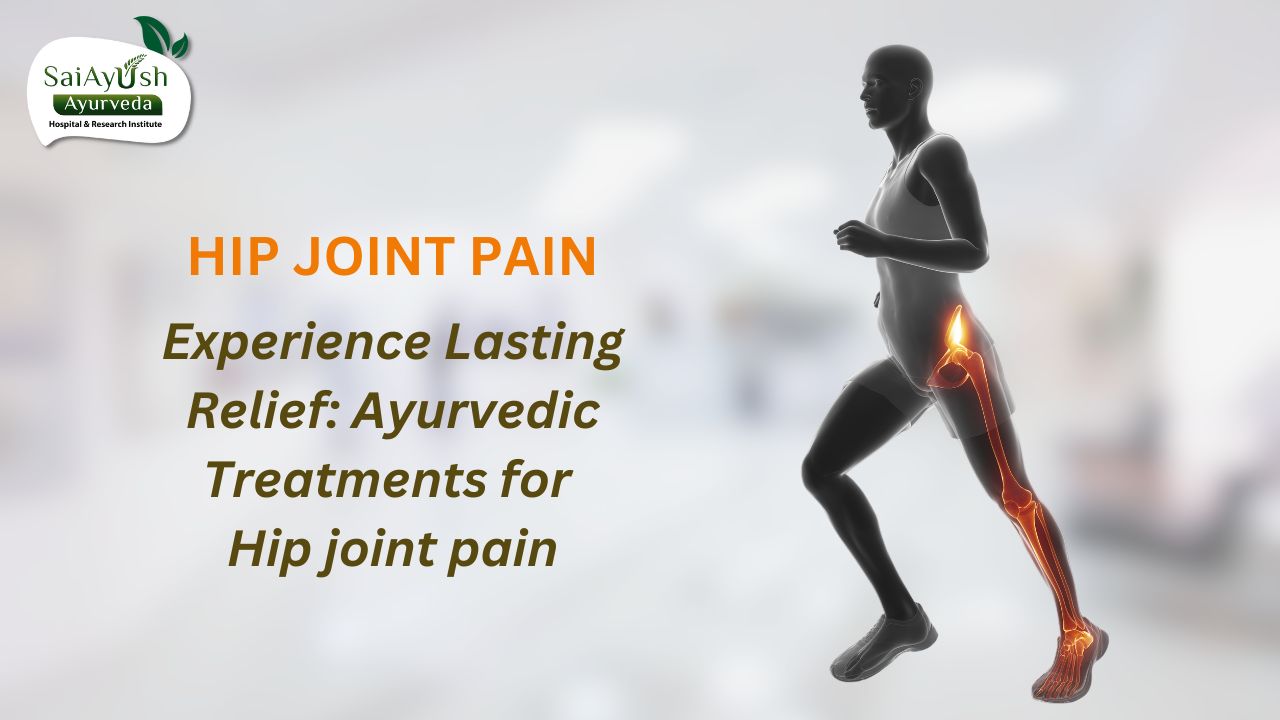Hey there, fellow health and wellness enthusiasts! In this blog post, I want to delve into the world of hip joint pain and explore how Ayurveda, the ancient Indian system of medicine, can help alleviate this discomfort naturally. If you’ve been struggling with hip joint pain or simply want to learn more about this topic, you’ve come to the right place. So, let’s get started! Understanding Hip Joint Pain Causes of Hip Joint Pain Hip joint pain can have various causes, including:
- Osteoarthritis: The most common cause of hip joint pain, where the protective cartilage in the joint wears down.
- Rheumatoid Arthritis: is an autoimmune condition in which the body’s immune system attacks the joints, leading to inflammation and pain.
- Hip Fractures: are injuries that occur due to accidents or falls, often resulting in severe hip joint pain.
- Bursitis: Inflammation of the bursae, tiny sacs filled with fluid that protect the hip joint.
- Tendinitis: Inflammation of the tendons surrounding the hip joint.
- Muscle Strains or Sprains: Overuse or injury to the muscles and ligaments supporting the hip joint.
Risk Factors for Hip Joint Pain
Certain factors can increase the risk of developing hip joint pain, such as:
- Aging: As we age, the risk of hip joint pain, particularly osteoarthritis, increases.
- Obesity: Excess weight puts additional stress on the hip joints, leading to pain and discomfort.
- Sedentary Lifestyle: Lack of regular physical activity can weaken the muscles supporting the hip joint, making it more prone to pain.
- Previous Injuries: Previous hip injuries or surgeries may increase the likelihood of experiencing hip joint pain.
- Genetics: A family history of hip joint problems can contribute to the development of pain.
Signs and Symptoms of Hip Joint Pain
Hip joint pain can manifest in various ways, including:
- hip joint or groin discomfort
- Stiffness and limited range of motion
- Difficulty walking or bearing weight on the affected hip
- Clicking or grinding sensations in the hip joint
- Muscle weakness or fatigue in the hip area
Ayurvedic Perspective on Hip Joint Pain According to Ayurveda, hip joint pain is primarily associated with an imbalance in the Vata dosha, which governs movement and flexibility in the body. Imbalances in other doshas, such as Pitta and Kapha, can also contribute to hip joint pain.
Ayurvedic Treatments for Hip Joint Pain
Internal Treatments: Herbal Supplements: Ayurveda offers a range of herbal remedies that help reduce inflammation, nourish the joints, and relieve pain. Some commonly used herbs include turmeric, ginger, shallaki, and ashwagandha.
External Treatments: Ayurvedic Oils: Massaging the affected area with warm Ayurvedic oils infused with pain-relieving herbs can provide relief and improve circulation.
Panchakarma:
Abhyanga: This is a full-body oil massage using warm Ayurvedic oils. Massaging the affected hip joint with warm oil can help improve circulation, reduce pain, and promote relaxation..
Kati Basti: In this therapy, a well-like structure is created around the hip joint using dough, and warm medicated oil is poured and held within it for a specific duration. It can help lubricate the joint and reduce pain.
Patra Pinda Sweda: This technique involves gently massaging the affected area while using a bundle of herbal leaves dipped in warm oil. It can aid in reducing discomfort and swelling.
- Hot and Cold Therapy: Alternating hot and cold compresses on the hip joint can help reduce inflammation and relieve pain.
- Ayurvedic lepam: Applying herbal patches or poultices to the affected area can provide localized relief and promote healing.
Managing Hip Joint Pain with Ayurveda
Apart from specific treatments, adopting certain lifestyle changes can help manage hip joint pain effectively.
- Maintain a Healthy Weight: Losing excess weight can reduce the burden on your hip joints, easing pain and discomfort.
- Follow a Balanced Diet: Including anti-inflammatory foods like turmeric, ginger, and omega-3 fatty acids in your diet can support joint health.
- Practice Gentle Yoga: Engaging in gentle yoga poses that target the hip joints can improve flexibility and alleviate pain.
- Avoid Prolonged Sitting: Taking breaks and avoiding long periods of sitting can prevent stiffness and discomfort in the hip joints.
Conclusion Hip joint pain can significantly impact our daily lives, but with the wisdom of Ayurveda, we have natural solutions at our disposal. By addressing the root causes, adopting a holistic approach, and incorporating Ayurvedic treatments, we can find relief from hip joint pain and improve our overall well-being. Remember, always consult with a qualified Ayurvedic practitioner before starting any new treatments.
Discover the healing power of Ayurveda with our latest article at Sai Ayush Ayurveda Hospitals! Dive into the age-old wisdom that can rejuvenate your body and mind. Click here to read more:



0 Comments